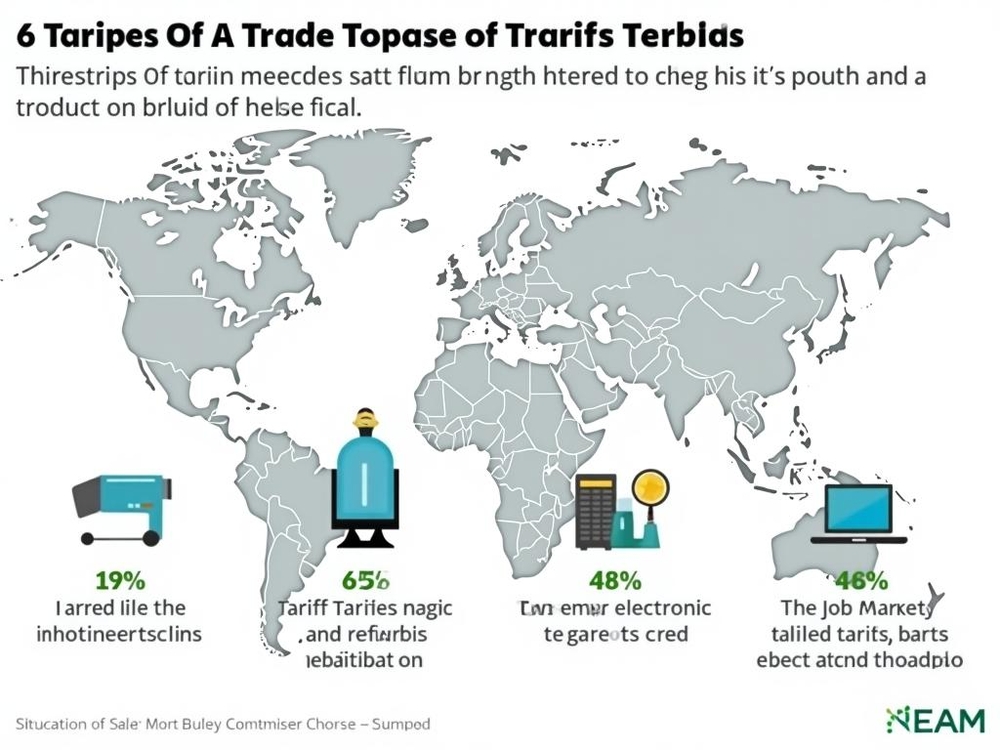Published
- 4 min read
Understanding the Impact of Trade Tariffs on the Economy

Us stocks plummet as trump tariffs approach; Tesla deliveries, payrolls on horizon
U.S. stocks took a big hit on Monday. Markets are on edge ahead of President Donald Trump’s trade tariffs set for April 2. The fear of slowing economic growth is growing.
Early in the day, the Dow Jones fell 200 points (0.5%). The S&P 500 dropped 55 points (1%). The Nasdaq was down even more, losing 275 points (1.6%).
Major indices seem like they’ll end the month much lower. Trade tensions and economic worries are the main causes.
Tariff concerns intensify as “liberation day” draws near
People in finance are nervous. President Trump is about to announce new trade tariffs on April 2, a day he calls “liberation day.”
He’s considering tougher tariffs on more countries. Trump wants to fight what he calls unfair trade practices against the U.S.
Last week, worries rose when Trump said there would be a 25% tariff on foreign-made cars. This change starts April 2. More tariffs might hit other sectors like commodities, semiconductors, and pharmaceuticals.
Wall Street is worried. The tariffs will affect American importers and could increase inflation. This might slow U.S. economic growth. Like past tariffs under Trump, the fear is economic damage. Goldman Sachs expects inflation to go over the Federal Reserve’s 2% target by 2025.
These tariffs are not just about cars. They could hit consumer electronics, agriculture, and more. Consumer electronics might get pricier. Farmers could see their profits drop. The tariffs matter to many sectors.
International voices on tariffs
International trade partners are not too happy. Some economic analysts and global trade experts oppose these tariffs. They believe tariffs can harm not just the U.S. but also global trade relations.
Countries like the EU and China offer lessons. They’ve used tariffs to protect local industries. This leads to trade wars and retaliatory measures. Such policies create uncertainty. Businesses might face higher costs. Consumers might pay more.
Critics say these tariffs might disrupt international supply chains. This could escalate into bigger trade conflicts.
How do trade tariffs affect everyday life?
Trade tariffs have a real impact on daily life. When tariffs go up, the cost of imported goods can rise. This means things like phones, TVs, and food might cost more. So, if you’re buying a new phone or a car, you might notice a price hike.
These tariffs might also affect jobs. Companies that rely on importing goods could struggle. They might hire less or even lay off workers. This can affect job markets and economic opportunities.
People might also feel less confident about the economy. Higher prices mean less spending money. When people worry about paying more, they hold back on buying things. This affects businesses and the wider economy.
Critical employment data approaching
Big economic reports are arriving this week. The important March jobs report is front and center.
Economists think the U.S. added 139,000 jobs in March. This is down from February’s 151,000. The unemployment rate should stay at 4.1%.
Before the nonfarm payrolls report on Friday, there will be data on manufacturing, services, and private employment. The health of the labor market is key for Federal Reserve decisions.
On Friday, markets were edgy after inflation data showed a surprise rise for February. This gives the Federal Reserve reasons to keep interest rates steady, especially during these uncertain times.
Tesla prepares to release quarterly delivery numbers
Tesla is about to share its first-quarter delivery numbers. This data is expected on April 2. Many expect a year-over-year drop in sales.
Challenges for Tesla include backlash over Elon Musk’s political actions. Protests are happening at different Tesla sites.
Oil markets heading toward quarterly decline
Oil prices rebounded Monday. Despite gains, they are still on track for a quarterly decline. Global trade tensions are dampening hopes for economic activity.
Both major oil benchmarks are heading for their first quarterly drop in three months. This is despite recent weekly gains.
Gold prices hit record highs on Monday. Investors see gold as a safe bet amid fears of more trade tariffs. The economic policy experts say this is about the uncertainty in global trade policy. Various economic sectors might feel the effects.
Summary
This article was about the impact of Trump’s trade tariffs on the U.S. and global markets. These tariffs could affect numerous sectors, from automobiles to consumer electronics and agriculture. International trade partners and analysts have different views, some opposing the tariffs. These changes could lead to higher costs for everyday products and affect job markets. Looking forward, the reader should watch reports like the March jobs report for more insight into economic conditions.